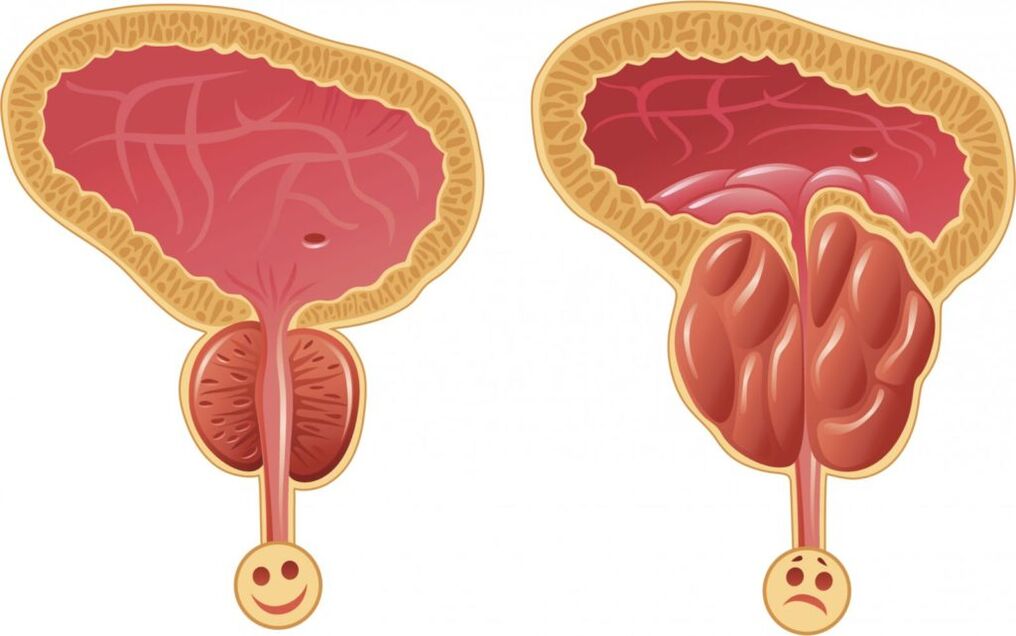Approximately one-third of men of active reproductive age, between the ages of 20 and 40, suffer from chronic prostatitis. Due to the disease, the quality of life of many patients deteriorates significantly. Chronic prostatitis is difficult to treat, but it can improve well-being, restore impaired functions, and get rid of painful symptoms for long periods of time. The most important thing is to choose the right treatment regimen. Of course, this is the job of the doctor, but in any case, it is helpful to know what medications can be used during treatment. Let’s talk about what medications exist to treat prostatitis and how they work.
Groups of drugs for prostatitis
The cause and mechanism of any disease - and prostatitis - is the development of the pathological process and its clinical manifestations. Accordingly, the directions of treatment also differ.

The question may arise: why is it not possible to limit oneself to etiotropic treatment, because after the cause has stopped, the development of the disease must stop, the symptoms disappear? Not all is easy with chronic diseases, including prostatitis. First, the cause cannot always be found and eliminated. Second, once the pathological mechanism is in place, it supports itself, and even eliminating the etiological factor does not guarantee recovery. So a universal cure for prostatitis has not yet been developed: today, every relationship in therapy is important.
Etiotropic drugs
The etiology of chronic prostatitis is not fully understood. On the one hand, infection is considered to be the cause of the inflammatory process. No microbes are found in the tissues of a healthy prostate. On the other hand, the rate of bacterial prostatitis in the overall structure of the incidence is only around 10%, with the remaining 90% of cases being the bacterial form. It is likely that the infection plays a role only in the early stages of the disease, as it is the causative agent of the pathological process in the prostate gland. In the future, the importance of the microbial flora will decrease and pathological changes in the tissues of the prostate (stagnation, impaired microcirculation, autoimmune mechanisms, etc. ) will become an increasingly important factor. What medications are used to treat prostatitis?
Ethiotropic therapy for bacterial prostatitis involves the appointment of antibiotics. Not everything is as simple as it seems. First, the spectrum of microorganisms is changing: while E. coli until recently dominated the pathogens of chronic prostatitis, chlamydia, mycoplasma, ureaplasma, gardnerella, trichomonads are now increasingly common. They are not sensitive to previously used antibiotics. Second, the resistance of microbes to the effects of antibacterial agents increases. Therefore, etiotropic drugs for the treatment of prostatitis should only be prescribed after the type of pathogen and its susceptibility to antibiotics have been determined.
Effective antibacterial drugs for prostatitis are consideredfluoroquinolones. They penetrate the tissues of the prostate well and form a high enough concentration in them to kill microbes. Another advantage of fluoroquinolones is their broad spectrum of action: many pathogenic bacteria are sensitive to them. This class of drugs for the treatment of prostatitis includes agents such as ciprofloxacin, levofloxacin, lomefloxacin, and others.
If chlamydia and other intracellular microorganisms are detected,macrolidesandtetracyclines. They are active against specific flora, but have a bad effect on the typical pathogens of chronic prostatitis - Escherichia coli, staphylococci. The advantage of macrolides is low toxicity.
Preparations for pathogenetic therapy
A complex of changes occurs in the background of chronic inflammation of the tissues of the prostate. Stasis of secretion, deterioration of venous outflow, confusion of glandular trophism, gradual development of fibrosis (replacement of healthy connective tissue), suffering from immunity. These interrelated pathological lesions support the inflammatory process and reduce the efficacy of etiotropic therapy. Restoring the structure and function of the gland through pathogenetic therapy helps to break the vicious circle. Because many factors play a role in the pathogenesis of chronic prostatitis, drugs in this group are diverse.
- Immunomodulators. In a chronic inflammatory process, the work of all parts of the immune system is disrupted. Immunomodulators regulate defense mechanisms, helping to fight inflammation and infections. This is a large group of drugs that have different mechanisms of action.
- Antioxidants. One of the pathological mechanisms that accompany inflammation is oxidative stress. Prostate cells are damaged by free radicals, which are formed in large amounts in the secretion of the prostate gland due to a sharp increase in the content of leukocytes. Oxidative stress exacerbates and maintains the inflammatory response. To stop this process, antioxidants are prescribed for chronic prostatitis: zinc, selenium, copper preparations, vitamins A, C, E, folic acid, L-carnitine, glutathione, resveratrol, and others.
- Enzyme preparations. Due to chronic inflammation, oxidative stress, lack of blood supply, healthy glandular tissue is replaced by connective tissue. Enzyme preparations (mainly based on hyaluronidase) slow down the development of fibrosis.
note
Of the drugs used for prostatitis, peptide bioregulators derived from the prostate gland of animals deserve special attention. They have a selective effect on the prostate, in particular they improve blood flow and restore microcirculation. As a result, the swelling is reduced, the risk of blood clots is reduced, the pain is relieved, urination is normalized and the prostate is restored. In some cases, it is possible to use such drugs to prevent prostatitis.
Symptomatic medications
One of the main goals in the treatment of chronic prostatitis is to save patients from the painful manifestations of the disease. Symptomatic agents do not affect the course of the inflammatory process, but alleviate the condition of patients. So what helps with prostatitis?
- Alpha blockersblocks nerve impulses from receptors in the smooth muscle of the prostate, urethra, and bladder. As a result, the spasm stops, the pain disappears, and urination returns to normal. The effect does not happen immediately, but two weeks after starting treatment.
- AnticonvulsantsIt is prescribed for the same purpose as alpha-blockers. They help relax smooth muscles. Removal of the spasm reduces pain and restores urine output.
- NSAIDsused to relieve pain and reduce inflammation. These drugs work quickly, but cannot be used for long treatment cycles due to the risk of side effects.
The drug in the form of suppositories helps to restore the functions of the prostate gland, helps relieve pain and improve the urination process.
How to choose a drug to treat prostatitis
The urologist selects the therapeutic regimen and medications for the treatment of prostatitis based on the results of the diagnosis and analysis of the patient's complaints. Therapy for the disease must be comprehensive: only in this way can a stable and lasting effect be achieved. If the tests show an infection, the doctor will definitely prescribe an antibiotic according to the type of pathogen. In other cases, pathogenetic and symptomatic therapy is used. The latter is selected on the basis of the prevailing complaints. For example, if a patient is worried about pain, NSAIDs are prescribed. Alpha-blockers are used for urinary problems.
Drugs used in prostatitis differ not only in the composition and mechanism of therapeutic effect but also in the form of release. The main ones are tablets, capsules and suppositories. Injectable drugs are used less frequently.

The tablets and capsules are convenient to take. On the one hand, suppositories act faster: through the wall in contact with the prostate, the active substance is immediately delivered to the site of inflammation via the lymphogen. Second, drugs in the form of suppositories have a greater bioavailability: unlike tablets, they are not metabolized in the liver and the concentration of active ingredients is not reduced. Finally, suppositories are safer in terms of side effects: in particular, they have virtually no negative effects on the gastrointestinal tract.
The modern treatment regimen for chronic prostatitis pays attention to all components of therapy: etiotropic, pathogenetic, and symptomatic. Medications should be selected by the physician, focusing on the results of the tests and the patient's complaints. An integrated approach to treatment and selection of appropriate medications will help restore impaired functions and forget about the symptoms of prostatitis for a long time.
Suppositories for prostatitis
One of the drugs often prescribed by urologists for the treatment of chronic prostatitis is in the form of suppositories. This device has been used in clinical practice for more than 30 years.
The active ingredient in the suppositories is bovine prostate extract. It contains a complex of peptides that have a regulatory effect on prostate cells. The drug improves microcirculation and venous outflow, thereby reducing inflammation and swelling, as well as reducing pain.
Indications for use - chronic abacterial prostatitis, conditions before and after prostate surgery, benign prostatic hyperplasia.
Suppositories are highly bioavailable. Low molecular weight peptides readily penetrate biological barriers and become the focus of inflammation. A high degree of cleaning minimizes the risk of allergic and other adverse reactions.
Bovine prostate extract suppositories are compatible with antibiotics and other drugs used in the complex therapy of chronic prostatitis. The tools are used in a short course (from 10 days). However, it is affordable.






























